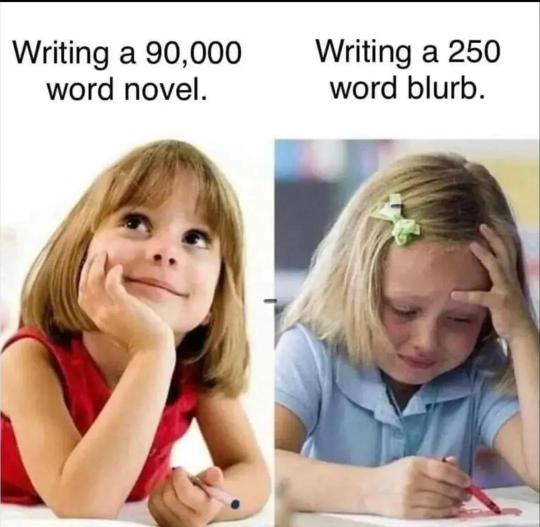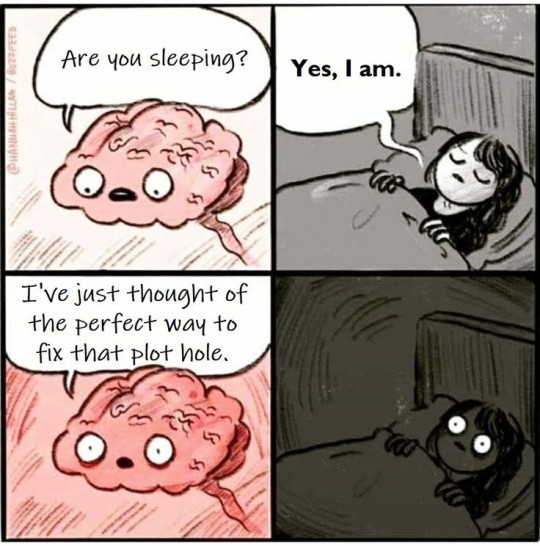mobile navigation "stories are what make us human" Andrew HintonNew weekly original content tagged: #writingwednesday. British writer with a strong interest in fantasy romance, supernatural drama, and tales with a twist. ♥ dogs, wine, bbqs, the ocean, and fic comments! on the writer peeps sheet & writeblr list WiP: WRE / WiP: Sorceress Apprentice / My Fiction tag / My Website / My WiPs page / Tags page / About Me
Don't wanna be here? Send us removal request.
Text
Let the Reader Know Something the Character Doesn’t.
Let them know the murder is waiting just beyond the door.
Let them see the traitor slip poison into the drink.
Let them watch helplessly as the character walks into a trap.
The best tension isn’t just about surprise, it’s about dread.
289 notes
·
View notes
Text
Posture & Physical Presence For Writers
(Because how they stand can say more than how they speak.)
Upright and stiff — Formal, tense, or deeply uncomfortable. Slouched shoulders — Insecure, exhausted, or defeated. Relaxed stance — Open, comfortable, confident. Hands in pockets — Guarded, casual, or hiding something. Crossed arms — Defensive, cold, or waiting to be impressed. Leaning forward — Engaged, flirtatious, or impatient. Back straight, chin high — Proud, stubborn, or putting on a show. Shifting weight side to side — Nervous, indecisive, or stalling. Foot tapping — Anxious, impatient, or barely holding it together. Arms loose at sides — Neutral, calm, open to the moment. Fidgeting with sleeves/hair/etc. — Inner turmoil disguised as casual touch. Spine curled inward — Trying to be small, invisible, or unnoticeable. Standing too still — Suppressed emotion, discomfort, or internal freeze. Dominant stance (feet wide, chest forward) — Confidence, aggression, or showmanship. Head tilted slightly — Curiosity, confusion, or playful challenge.
4K notes
·
View notes
Text

The struggle is real!
7 notes
·
View notes
Text
I’ve come to the harrowing realisation that the only way to write my book is to write my book
I may never recover
4K notes
·
View notes
Text
How to Actually Write a Fairytale
Writing a fairytale isn’t about copying what came before. It’s about echoing it and breathing new life into the bones of old stories, while still leaving fingerprints that are entirely your own.
➥ Know the Genre Like It’s Your Grandmother’s Favorite Story
You don’t have to memorize every tale from the Brothers Grimm or Andersen, but you do need to understand the rhythm of a fairytale. The structure. The tone. The strange, brutal, beautiful logic where wolves talk and curses are casually handed out like snacks.
Read the classics—but don’t just admire them. Ask why they’ve lasted. Why we keep retelling “Cinderella” or “Beauty and the Beast.” Why we crave stories where the wicked are punished and the good get their happily ever after (or… don’t).
Then, ask yourself: what do you believe about happy endings?
➥ Make the World Feel Like a Dream You Just Woke Up From
Your setting shouldn’t feel like a postcard, it should feel like a mood. That forest? It’s not just a bunch of trees. It’s ancient and alive and maybe watching you. That castle on the hill? What lives inside it isn’t just royal—it’s wrong.
Don’t overdescribe. Don’t over-explain. Fairytale settings thrive on feeling, mystery, awe, fear, delight. Focus on texture and sound. On atmosphere. Give the reader goosebumps with a sentence, not a paragraph.
➥ Use Archetypes Like Skeletons, Not Cages
Yes, fairytales run on familiar characters: the hero, the princess, the wicked stepmother. But don’t just copy and paste those roles. Twist them. Make your hero afraid of bravery. Let your princess save herself and then ask why she even needed saving in the first place.
Give your characters choices. Inner lives. Secrets. Let them lean into their archetypes and then stumble out of them. That’s what keeps your story from feeling like a copy of a copy.
➥ Say Something That Matters (Even If It's Wrapped in Magic)
Fairytales aren’t just bedtime stories, they’re moral delivery systems in disguise. Every ogre, quest, and talking raven is hiding a deeper truth.
So what’s yours?
Don’t force it. But do let your story mean something. Maybe it’s about growing up. About forgiveness. About not trusting charming strangers with cursed apples. Let the theme grow like ivy between your lines, quiet but impossible to ignore.
➥ Add a Sprinkle of Strange With Magical Beings
It doesn’t have to be a fairy or a dragon... though those are always welcome. Think beyond the usual. A dog who speaks only in riddles. A grandmother made of smoke. A house that walks on bird legs (looking at you, Baba Yaga).
Make your magic feel old. Like it was here before your character showed up, and it’ll be here long after they’re gone.
➥ Don’t Be Afraid to Make It Hard
Fairytales are not soft. They have teeth. Let your characters struggle. Let the curse hurt. Let the villain win for a minute too long.
Readers don’t fall in love with perfect heroes—they fall in love with tested ones. Give your characters impossible tasks. Curses that twist them into shadows. Quests that demand sacrifice.
Then let them choose who they want to be on the other side.
➥ Use the Old Bones, but Give Them Your Voice
Start with “Once upon a time” if it feels right. Or don’t. Just make sure the story has rhythm. Fairytales move fast, but not rushed. They feel inevitable. Like fate wrapped in a metaphor.
Keep it simple, but not shallow. Let your prose feel like poetry snuck in wearing a cloak. Make your reader feel like they’re hearing a story that’s older than memory, even if you wrote it yesterday.
➥ Magical Objects? Yes Please. But Make Them Count
Magic beans, mirrors, rings, cloaks... yes. But don’t just throw in trinkets like party favors. Give them purpose. The thing that glows should glow for a reason. The potion should do more than heal, it should reveal. Or trick. Or demand a price.
Magic in fairytales always comes with rules. Use that. Break your character with the thing that’s supposed to save them.
➥ Let People Change (and Not Just With a Magic Wand)
True transformation in a fairytale isn’t just “frog turns prince.” It’s “child becomes brave.” “Witch becomes mother.” “Monster learns to forgive themselves.”
Let your characters grow, like painfully, beautifully. Give them chances to change, and the agency to take them. Or not. Either way, that’s where the real magic is.
➥ You Get to Choose the Ending
Happy? Bittersweet? Vaguely cursed but weirdly satisfying?
You’re not chained to “...and they lived happily ever after.” You can write “…and she never returned to the forest, but it never stopped watching her.” Or “…and his heart stayed quiet for the rest of his life, but at least it was his.”
Just make it feel like an ending. One that lingers. One that knows the story is done, but the lesson might echo long after the last line.
211 notes
·
View notes
Text
Emotionally Questionable but Artistically Valid Things To Do When You’re a Writer Losing the Plot (Literally or Figuratively)
Write your WIP’s obituary. “She lived a chaotic life, filled with plot holes, unresolved arcs, and one very confusing love triangle. She is survived by a Google Doc, 74 sticky notes, and a Pinterest board titled ‘vibes but make it pain.’” Bonus catharsis if you make it weirdly tender. Double bonus if you actually cry a little.
Make your WIP a dating profile. Age: Timeless. Location: Trapped in your brain since 2018. Looking for: A writer who won’t ghost me mid-draft. Interests: Slow burn tension, morally gray decisions, and long walks through traumatic backstory. Will it match with anyone? No. But you might remember why you fell in love with it in the first place.
Assign your plot holes a Hogwarts house. That one you keep ignoring? Slytherin. The subplot that’s doing too much? Hufflepuff with main character energy. The gaping logic error you swear you’ll fix later? Ravenclaw, but drunk. Somehow this helps. Somehow this feels like control.
Write a resignation letter from your genre. “Dear Fantasy, it’s not you, it’s me. Actually—it is you. The worldbuilding demands are emotionally abusive, and I just want to write messy little humans having conversations that ruin their lives.” You can always go back. Or not. You’re allowed to genre-hop like a chaotic frog with a laptop.
Host a fake podcast episode where you psychoanalyze your protagonist. Today on Therapy, But Make It Fictional, we discuss why Aiden cannot maintain a single healthy relationship, the consequences of childhood abandonment, and how trauma is not a personality trait (even though he tries). Record yourself. Don’t post it. Unless you do. I won’t stop you.
Put your WIP characters in a reality show. Big Brother: Emotional Damage Edition. Who cries first? Who forms a secret alliance? Who self-destructs on Day 2 because someone used their emotional trauma as a joke? (Yes, this is basically writing. Yes, this counts.)
Create an “Am I the Problem?” chart for your WIP. Spoiler: You’re not. The plot arc from hell is. But mapping it out like a true crime board will help. Use yarn. Use vibes. Use Google Slides if you’re a Virgo. Just externalize the chaos.
Write fanfiction… of your own book. That spicy scene you know you won’t put in because it messes with pacing? Write it. That “what if they shared a bed but didn’t touch” trope you secretly crave? Give in. You are your first fan. Be delulu. Be free.
Create a soundtrack for your villain’s redemption arc that will never happen. Include Lana Del Rey. Include Mitski. Include at least one angry violin solo. You don’t have to redeem them, but you can imagine them staring into the rain while “The Sound of Silence” plays.
Doodle your plot like a crime scene. Victim: Narrative Cohesion. Suspects: A surprise third act twist, a talking sword, and that one flashback chapter that broke the timeline. Go full corkboard-and-pushpins energy. You’ll either solve it or at least feel like an unhinged genius. Which is basically the same.
661 notes
·
View notes
Text

Cause of my insomnia number one:
17K notes
·
View notes
Text
guy who is fun-ruiningly pedantic about the differences between a labyrinth and a maze
40K notes
·
View notes
Text
There is no greater bond than the one between a person and the fictional character they’ve written 50k+ words about
10K notes
·
View notes
Note
The thing nobody tells you is that you can just write down that one scene you've been replaying in your head with no connections to anything. You don't have to wait until the plot get there or until you come up with the rest of the story around it that makes that scene makes sense. You can just write that one scene.
you are so right
3K notes
·
View notes
Text
So close LibreOffice! The word I was looking for was arsenal.

Thanks for the suggestion though.
57K notes
·
View notes
Text
every writer has That One Scene that lives in their head rent-free but they can’t write it yet because “the vibes aren’t ripe”
11K notes
·
View notes
Text

Write a piece designed to not upset anyone
20 notes
·
View notes
Text
A lil reminder for you today. The amount of words you did or didn’t write today doesn’t define your worth as a writer
129 notes
·
View notes
Text
Your first draft is a map
Think of your first draft like a map drawn in pencil. It’s not permanent, and it’s not meant to be.
You're sketching the shape of the story, not carving it in stone. Let yourself cross things out and redraw the path. That’s how you find the story worth keeping.
132 notes
·
View notes

